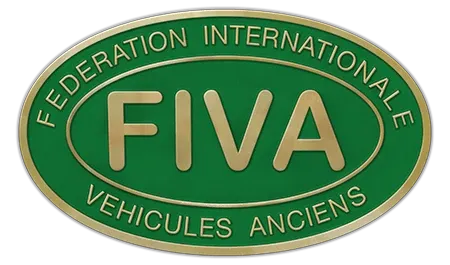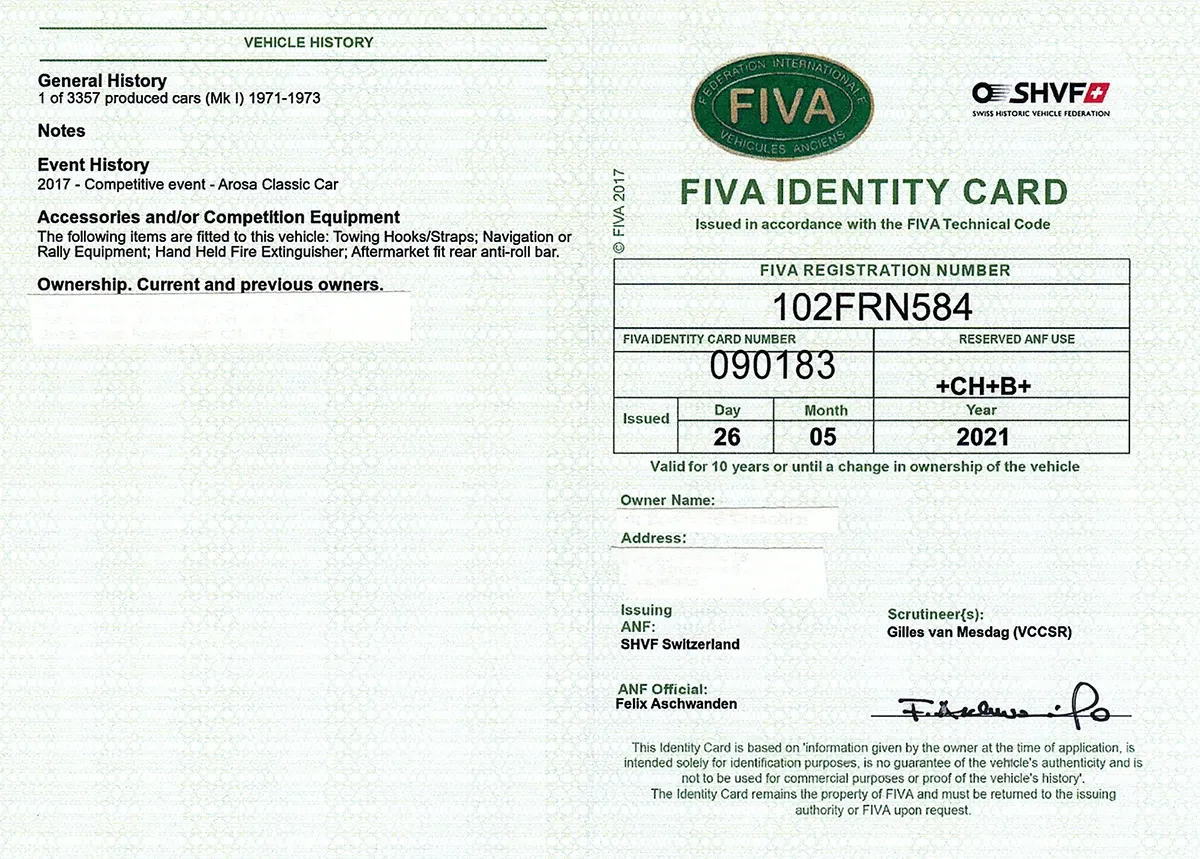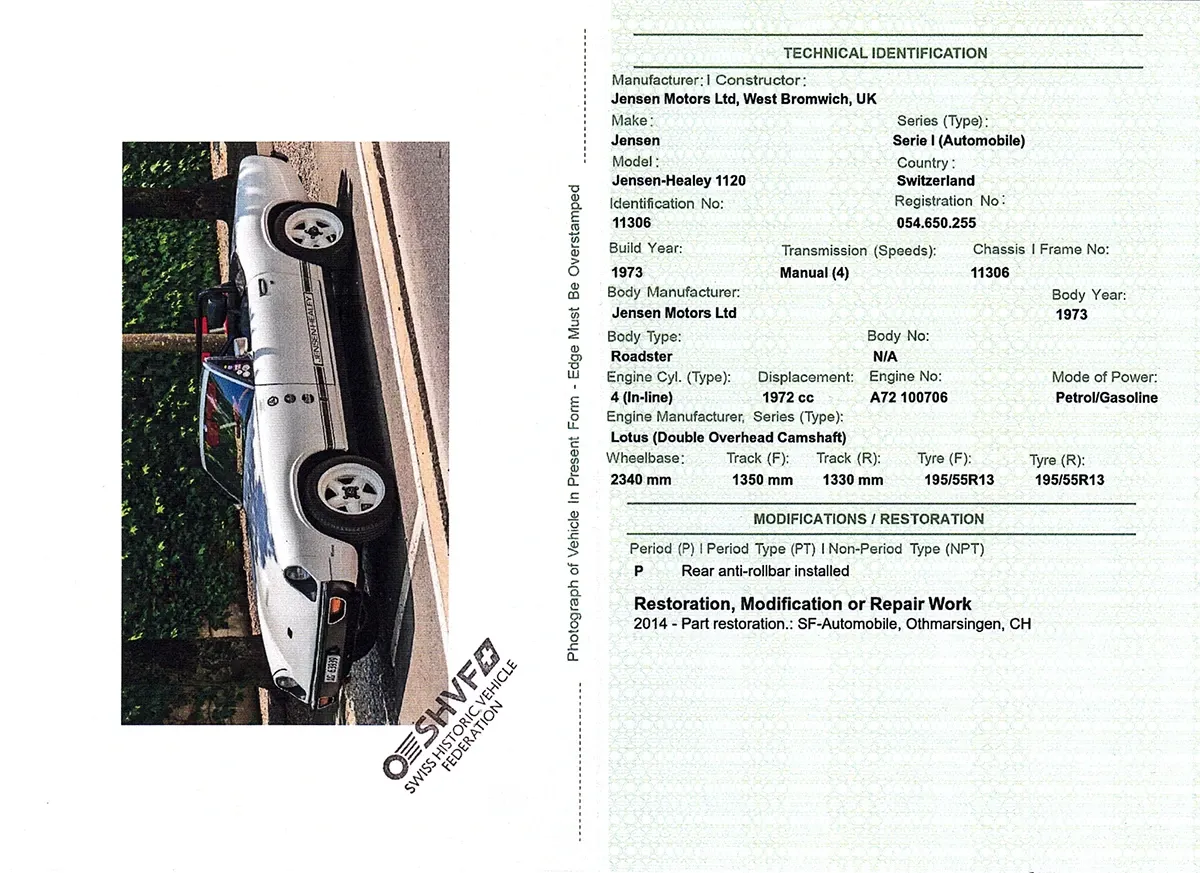FIVA Identity Card
The FIVA Identity Card is an internationally standardised document created in the name of FIVA, in which the identity, the technical specifications and the vehicle history known at the time of issue, including any modifications, are summarised.
The FIVA Identity Card enables the owner of a historic vehicle (whether an agricultural tractor, commercial vehicle, car or motorbike that is over 30 years old) to provide proof of originality and authenticity as well as the associated history via an internationally recognised document.
In the interests of owners and event organisers, all important data on such vehicles is collected internationally and thus preserved for future generations as documentation of cultural assets.
Apply for ID-Card
Details
Completing the application form
English language only and only via https://applications.fiva.org/
Ownership / Validity
The FIVA Identity Card is the property of FIVA. It loses its validity when the vehicle is sold or passed on or after the 10-year period of validity has expired.
The FIVA Identity Card is issued exclusively for identification purposes. The card does not guarantee the authenticity of a vehicle and may not be used for commercial purposes or to document the history of a vehicle. Neither the FIVA nor the SHVF shall be liable if the vehicle owner or a third party relies solely on the contents of a FIVA Identity Card.
Withdrawal of the FIVA Identity Card
The FIVA Identity Card can be checked by authorised persons at national and international events. In the event of discrepancies between the vehicle and the details on the FIVA Identity Card, the document may be confiscated for clarification. The owner will receive a collection confirmation / receipt.
The responsible ANF clarifies the facts and decides on changes to the FIVA Identity Card or the final withdrawal.
Applicable law and jurisdiction
The relationship between the SHVF and an applicant is governed exclusively by Swiss substantive law. The ordinary courts at the registered office of the SHVF shall have exclusive jurisdiction to judge any disputes in connection with the FIVA Identity Card.
Facts
The holder of a FIVA Identity Card has the following advantages:
– Comprehensive documentation of the vehicle data by an independent body
– Changes and conversions are recorded on the card
– Data and image are clearly assigned to the vehicle
– Helpful for obtaining the veteran entry in Switzerland (Code180)
– International recognition allows e.g. entry into German low emission zones
– Limited validity (10 years or change of ownership) increases credibility
The presentation of a valid FIVA Identity Card is required for participation in certain FIVA events.
A FIVA Identity Card may be required by the road traffic authorities or by potential buyers as proof of original condition and authenticity. Authenticity means genuineness in the sense of ‘found to be original’.
In the case of authentic vehicles, it can be proven that they
– are what they claim to be
– were actually produced by the manufacturer indicated
– were actually assembled at the specified time
There are owners who do not take the opportunity to apply for a FIVA Identity Card because they do not want or do not need to claim the reasons listed above for their vehicle.
It is definitely worthwhile for the owner to fill out the application form for a FIVA Identity Card at least once to ensure that the vehicle corresponds to its original condition.
If not, it is advantageous to know when and by whom these subsequent modifications were made.
The main identity carrier of a vehicle is the chassis, the frame or the monocoque or the self-supporting bodyshell.
The identity is the exact and complete combination of the following data:
– Vehicle manufacturer, with city and country
– Brand, model and series (type) designation
– Identification number(s)
–Year of manufacture
and the associated history of the vehicle.
The FIVA defines a historic vehicle as a mechanically powered road vehicle which
– is at least 30 years old,
– is preserved and maintained in a historically correct condition,
– whose use is not designed for daily use
– and is therefore part of our technical cultural heritage.
Further definitions can be found in the current version of the FIVA Technical Code and the associated supplementary documents.
The costs for a FIVA Identity Card are for members of a SHVF club:
CHF 150.00 for motorbikes / 3-wheel vehicles
CHF 180.00 for other vehicles, trailers etc.
The costs for a FIVA Identity Card are for members of a SHVF club:
CHF 300.00 for motorbikes / 3-wheel vehicles
CHF 400.00 for other vehicles, trailers etc.
Payment of the aforementioned amounts is purely a fee for the work of the SHVF and its specialists. It does not constitute any entitlement to the issue of a FIVA Identity Card at all or to the issue of a FIVA Identity Card with a specific classification.
If the vehicle does not meet the requirements of the FIVA Technical Code for the issue of a FIVA Identity Card, the amount paid may be offset against the cost of clarification.
The SHVF reserves the right to demand additional compensation of CHF 30.00 if the application is incomplete or incorrectly completed and has to be returned to the applicant.
In addition to the SHVF fees, there is also an expense allowance for the vehicle inspector (scrutineer). This must be clarified in advance between the applicant and the scrutineer.
Minor document changes without a new application and vehicle inspection as well as special/express orders or special requests are charged at cost.
All payments in connection with FIVA Identity Cards must be made to the following account:
Postal cheque account 89-186643-4 or IBAN CH98 0900 0000 8918 6643 4, Accountholder SHVF, Bern. The name of the owner and the make and type of vehicle must be stated on payment.
On request, FIVA can issue a FIVA Identity Card for historic vehicles that fulfil the requirements of the FIVA Technical Code.
The issue of a FIVA Identity Card requires a physical inspection by the FIVA or its representative in conjunction with a corresponding inspection report. Based on the vehicle identity, the original condition (configuration, material, specification, etc.) is clarified and then compared with the vehicle as it is at the time of the inspection.
It is the owner's duty to provide FIVA with valid evidence and information so that FIVA can document the vehicle and issue a FIVA Identity Card.
The FIVA Identity Card may also contain verified information obtained from other sources.
The FIVA Identity Card always remains the property of FIVA and is valid for a maximum of ten years from the date of issue and loses its validity if there is a change of ownership within this ten-year period.
The FIVA Identity Card must be handed over to the authorized representative of FIVA upon request and can be revoked and confiscated by FIVA at any time.
The FIVA Identity Card is proof of the owner’s intention to continue to maintain his vehicle in a historically correct and environmentally friendly way.





